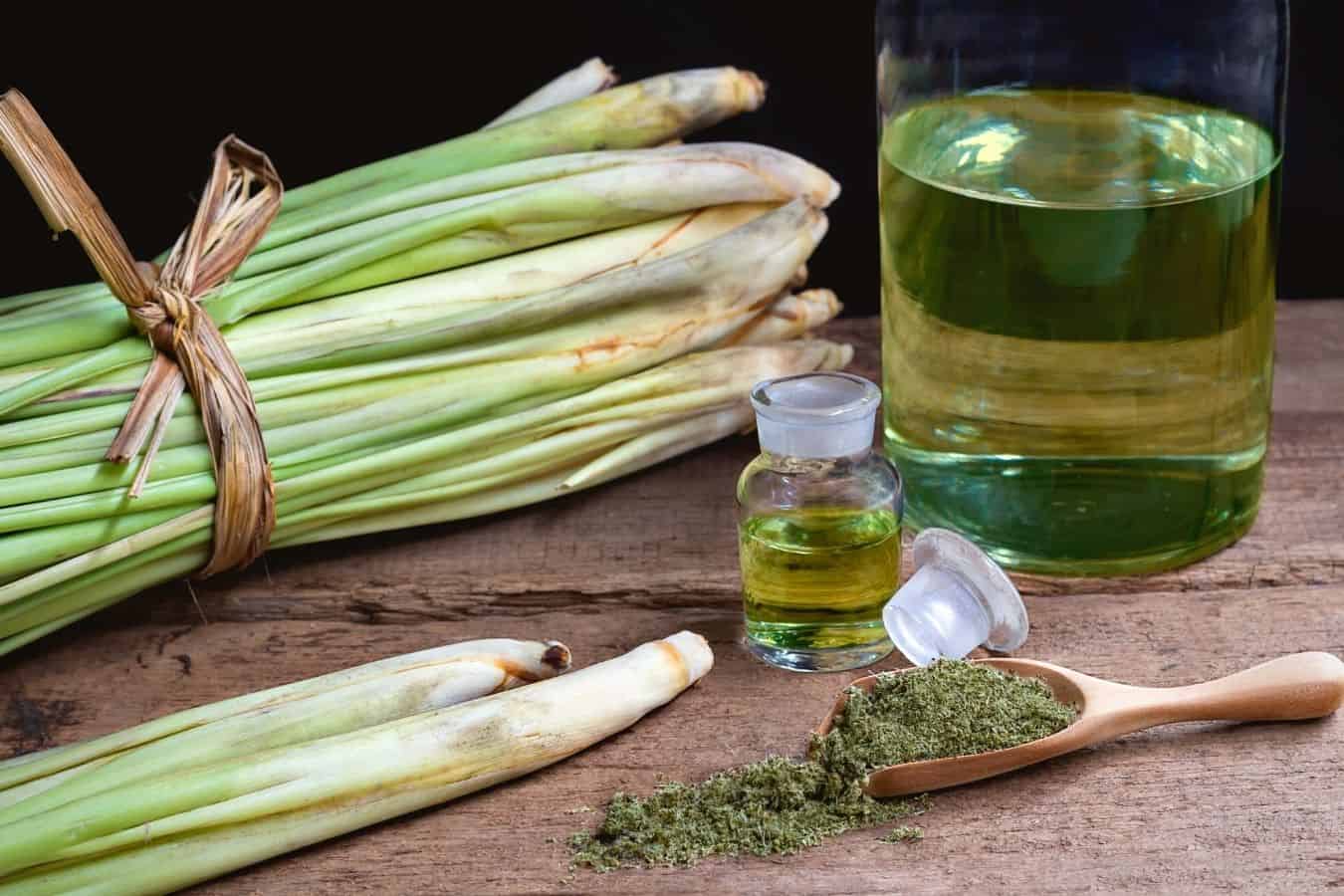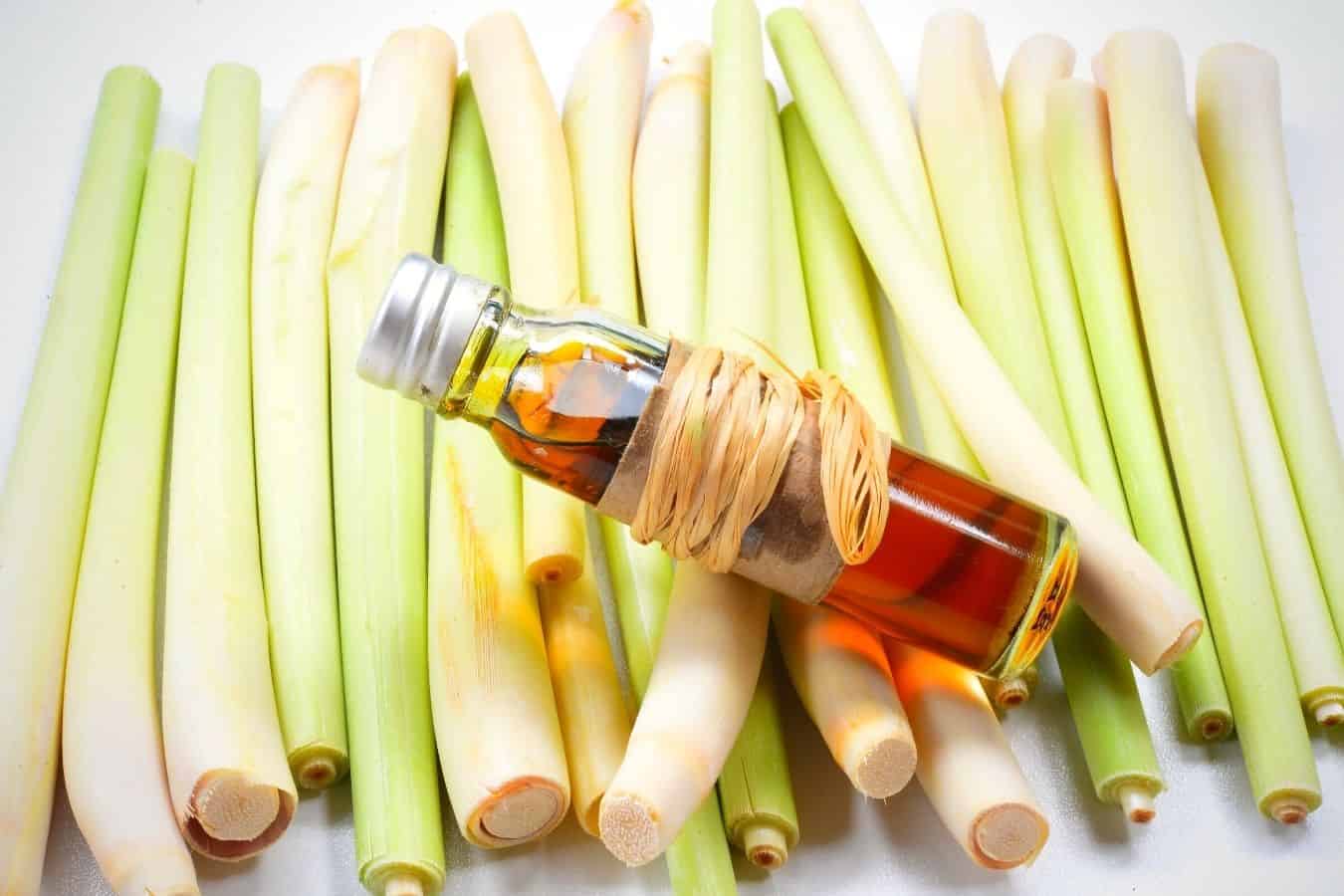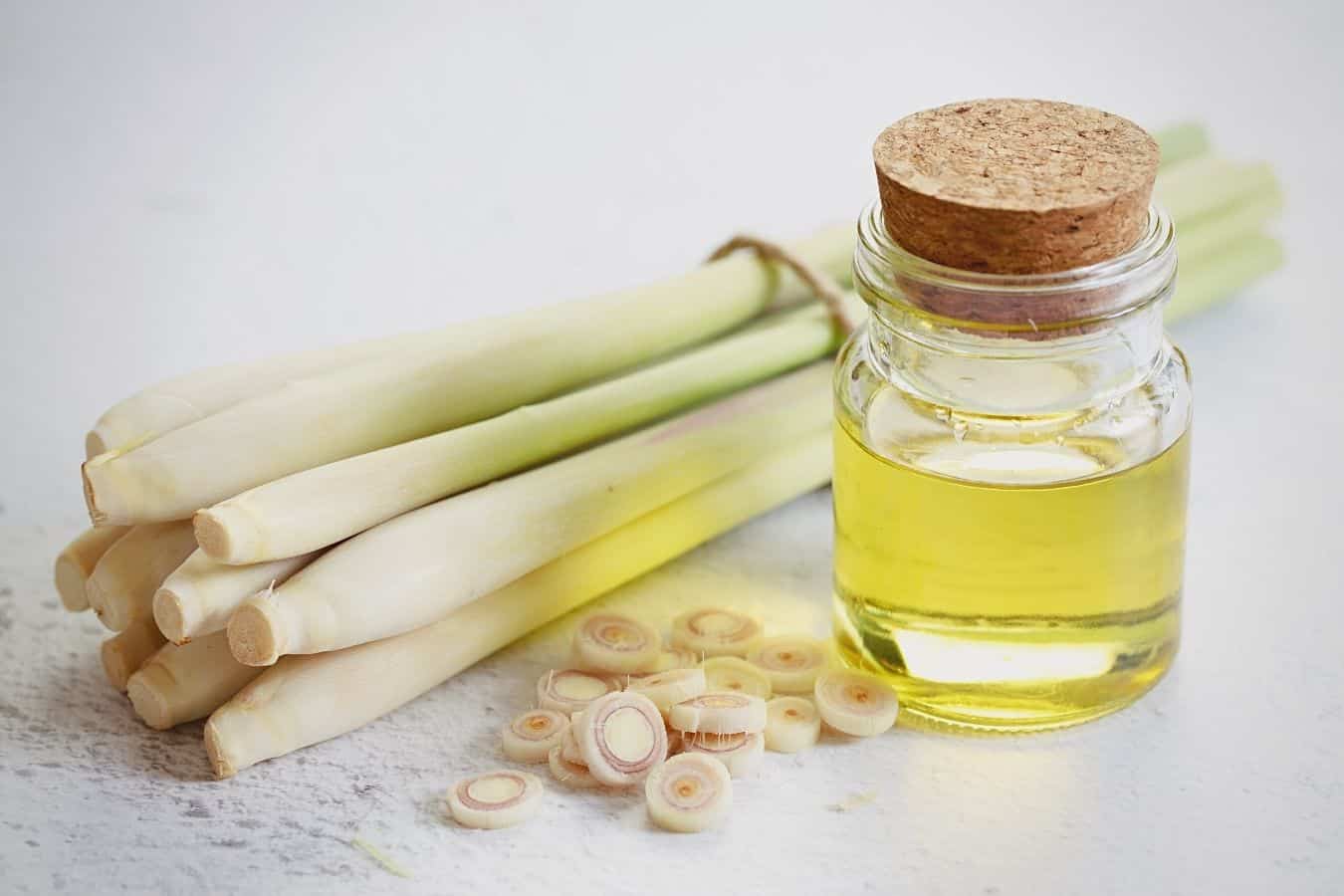You’ll possibly have used lemongrass oil for cooking, or smelled its aroma in a fragrance, but it also has many benefits for your hair.
From its antibacterial and antifungal qualities to potentially helping with hair growth, lemongrass oil has many benefits for your hair. It’s also great in other ways too, all of which we detail below.

What Is Lemongrass Oil?
Lemongrass is a member of the ‘Poaceae grass family, just like Citronella, and is known as Cymbopogon.
It’s a tall plant that grows along hot equatorial regions like Africa, Asia, and some areas of Australia.
It has tall leaves that are somewhat boat-like in appearance and can grow to around two meters in height.
If you crush the leaves of lemongrass, you’ll release a fragrant, citrus smell.
Lemongrass essential oil retains this zingy scent and is created by way of steam distillation. Lemongrass comes in two main varieties, both of which have different functions.
– Cymbopogon citratus is used for culinary purposes (you’ll likely find this lemongrass used in recipes)
– Cymbopogon flexuous is used in perfume and for aromatherapy and ayurvedic purposes. It’s this lemongrass that you’d be using on your hair.
The oil of the lemongrass plant is fairly thin and bright or pale yellow in color. Its scent is deeply refreshing and is loaded with vitamins like A, B1, B2, B3, B5, B6, folate, and Vitamin C.
It’s also bursting with plenty of antioxidants and minerals like Zinc, Magnesium, Calcium, and Iron.
It’s all these powerful compounds that make lemongrass so beneficial for hair.
Lemongrass has been used in traditional aromatherapy and herbal medicines thanks to its antiseptic, insecticidal, and antifungal qualities. For example, lemongrass tea is also very popular.
Lemongrass, therefore, has many benefits for your hair, but it’s also fabulous for your skin and the rest of your body in various ways.
5 Benefits Of Lemongrass Oil For Hair

1. Cleansing
Lemongrass oil is intensely cleansing. Adding a few drops of it to your regular shampoo can help to minimize any build-up from pollutants, products, or free radicals that may accumulate on your scalp and at your hair roots.
This in turn unlocks the hair follicle, creating conditions more conducive to hair growth (more on that below).
2. Antibacterial And Anti-Fungal
Research has shown that lemongrass has antibacterial qualities, and it also has anti-fungal qualities.
If you’re prone to a sensitive scalp, or suffer from eczema or psoriasis on your scalp, using diluted lemongrass essential oil can have benefits for both your hair and scalp skin, soothing any irritation.
What’s more, as lemongrass is anti-fungal, it will work against the development of fungal infections on your skin and nails – including your scalp skin, which will in turn improve overall hair health.
3. Helps Fight Dandruff
A 2015 study found that lemongrass oil reduced dandruff in hair after only one week’s use.
It does this because it’s anti-bacterial and anti-fungal, creating the conditions for a healthy, flake-free scalp and nourished unclogged hair follicles.
Mix some lemongrass oil into your shampoo and conditioner and use it daily, taking care to massage it into your scalp and strands.
4. Hair Growth
There is some research that lemongrass oil may help with hair growth, working to minimize hair loss. This is for various reasons.
One journal notes that lemongrass may boost individuals’ red blood cell count.
Boosting the body’s red blood cells means that there are greater amounts of iron and hemoglobin in that body – and lack of iron can be a reason for hair loss.
Regular use of lemongrass oil may therefore have innumerate benefits for people looking to support hair growth.
It’s a stimulant and works to unclog hair follicles, ensuring their healthy growth is supported.
Its astringent quality can help to manage sebum production on the scalp too, which in turn may support hair growth.
5. Fights Lice
Is there anything worse than lice? Thankfully, one of the lemongrass’s many benefits is in fighting those pesky hair-living creatures.
It’s antimicrobial and anti-fungal, helping to control and manage their growth, and its strong fragrance can suffocate the pests.
It’s best to use lemongrass oil with neem oil if you’re after this particular hair benefit – our recipe is below for you to follow.
Also Read: Does Bamboo Tea Work for Hair Growth? The Facts
How To Use Lemongrass Oil for Hair

Now that you’ve heard all the benefits of lemongrass oil for hair, you’re probably keen to jump in and experiment with this wonder ingredient.
But before you do so, remember to always dilute it.
You don’t want to be applying lemongrass oil to your hair or skin without mixing it with water, otherwise, you may experience unpleasant burning.
It’s also best to do a patch test first, too, before applying it all over.
The oils we’ve listed below for use with lemongrass essential oil are coconut, almond, jojoba, or olive oil.
Lemongrass also mixes well with sage oil, lavender oil, tea tree oil, rosemary oil, and peppermint oil. Once you’re confident blending lemongrass, you can mix and match to create lovely aromas.
Method One
This is a good recipe if you want to use lemongrass oil to manage dandruff or inflamed and irritated scalps.
1. Mix 2 – 3 drops of lemongrass oil with 1 cup of distilled water and half a cup of apple cider vinegar.
2. Use this as a hair rinse, leaving it to sit in your hair for around ten minutes before washing out.
3. Repeat this twice a week or so.
Method Two
This lemongrass oil recipe has benefits for people looking to help hair growth or treat dandruff.
1. Mix two drops of lemongrass oil for every teaspoon of alternative oil. If you’re looking for hair growth benefits, use coconut, almond, or jojoba oil, and if you want to treat dandruff, use olive oil.
2. Apply this mixture over your scalp and strands, and leave it to sit for half an hour if you’re using coconut oil, and an hour if using olive oil. If you wrap your hair with a towel or shower cap, this will allow the mix to really saturate your strands.
3. Wash your hair regularly to remove the mix, and condition as normal.
Method Three
Use this recipe if you’re battling lice.
1. Mix neem oil with a few drops of lemongrass oil, and massage it into your scalp.
2. Leave the mixture in your hair for half an hour.
3. Using your lice comb, remove the pests from your strands.
4. Wash and condition your hair as normal.
DIY Lemongrass Oil
Lemongrass essential oil derives from the steam distillation of the leaves – it’s these that contain the oil that goes into perfumes, hair care products, and skincare.
Care is taken throughout the process to ensure that the oil retains all of the original plant’s vitamins and minerals.
That said, if you’re keen to make your own lemongrass oil, you can do so by following the below recipe.
You’ll need:
– A mortar and pestle in order to grind the lemongrass
– Dried lemongrass – about six to eight stalks.
– An oil like almond or jojoba
– A clean airtight container
Method
1. You want to carefully break the stalks of the lemongrass, using the mortar and pestle to crush it into powder. This may take some time.
2. As you do this, you can warm up the oil of your choice – be careful not to let it boil.
3. Carefully tip this powder into your container of choice. Add the oil to the powdered lemongrass, and mix well.
4. Find a patch of sunlight and leave the container there for the lemongrass to infuse with the oil.
5. Once three or four days have gone by, strain the oil and remove any grit or leaves that remain. You can use a cheesecloth or tea towel, or a very fine sieve.
The distilled oil you get from this process can then be poured into whatever container you want and stored in a cool, dark place.
Also Read: Does Sunlight Work For Hair Growth? What You Need To Know
Are There Any Risks Associated with Lemongrass Oil?
As with the use of any essential oil, and as detailed above, you need to be diluting the lemongrass oil in order to feel its benefits on your hair and skin.
Some essential oils can cause allergic reactions in people – especially if directly applied without a patch test – which might cause redness, a feeling of burning or discomfort, and contact dermatitis.
If you’re prone to allergies, you should absolutely consult a physician before using lemongrass oil.
Other Benefits Of Lemongrass Oil
Lemongrass isn’t just used for hair care products, either.
As we’ll see below, its anti-inflammatory properties and other benefits make it a worthwhile product for those dealing with digestive issues, elevated blood pressure, and other health problems.
Healing Wounds
Remember how we said lemongrass oil is antiseptic and antifungal? For this reason, it’s great for cleaning and healing wounds, working as a natural disinfectant, and supporting the healing process.
Mix two drops of lemongrass oil with turmeric oil, and apply twice daily on the wound.
Pain Management
Lemongrass oil has citral in, which helps to manage pain and cramps as it has anti-inflammatory properties.
Lemongrass oil has long been used as a traditional method for helping with joint pain or even rheumatoid arthritis.
Mix one to two drops of lemongrass oil with one teaspoon of moringa oil, and rub into the afflicted area.
Skin Health
Anti-fungal, antibacterial, and anti-inflammatory, lemongrass oil is great for your skin’s health.
It can support and strengthen the skin’s barrier, making it more supple, as well as improving overall texture.
Lemongrass oil also helps to balance the skin’s sebum levels, making it a great natural acne cure.
Its antioxidants are also fantastic at battling the effects of free radicals and environmental pollutants that can cause breakouts.
Fill a bowl with warm water, mix in a few drops of lemongrass, and let the steam seep into your pores as a great natural decongestant.
Managing Digestive Ailments
Lemongrass oil is anti-diarrhetic, meaning it will help if your stomach is experiencing digestive problems, nausea, and other issues.
Mix two to three drops of lemongrass oil with coconut oil, and rub it onto your stomach for relief.
Headaches And Muscle Cramp
Lemongrass oil is known to help with the management of headaches and muscle cramps.
Mix one to two drops of lemongrass oil with one tablespoon of jojoba oil, and massage it onto your temples for headaches.
For muscle cramps, mix a few drops with castor oil and apply to the cramping area.
Lemongrass oil is also a fantastic addition to any homemade aromatherapy oil. You can use it in baths or as a massage oil, or even in a diffuser, helping to scent your home and relax your mind.
Disclaimer: This site is not intended to provide professional or medical advice. All of the content on LovedByCurls.com is for informational purposes only. All advice should be followed at your own discretion. Ingredients may change at any time so always check the product label before using. Check our full disclaimer policy here.
